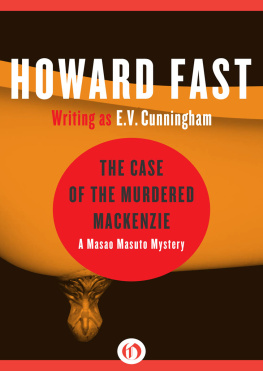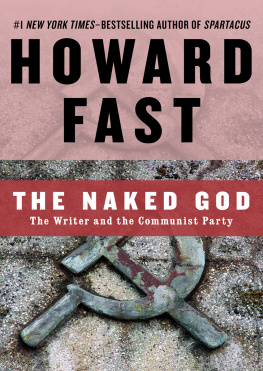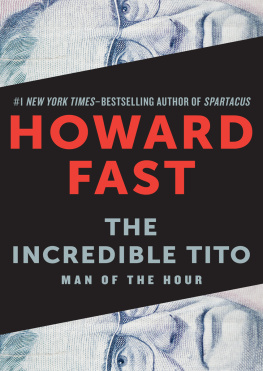Howard Fast
THE GENERAL ZAPPED AN ANGEL
STORIES
For Rachel and Paul:
Greetings

In 1950, Joseph McCarthy tried to silence Howard Fast. It was a fools errand. Called to testify before the House Un-American Activities Committee, Fast refused to name names, served three months in prison for contempt of Congress, and had to resort for some time to a pseudonym to survive the blacklist. It was scarcely a speed bump in a career of astonishing variety and prolificity. Fast was a novelist, an essayist, a poet, a playwright, a young adult author before that was even a named genre (his April Morning was a staple of middle school curricula for decades), a biographer, an autobiographer, and, as this volume attests, a short story writer. Something like one hundred books bore his name (or one of his aliases). His first novel was published in 1933, when he was eighteen, and his pace barely abated for the next seventy years. Even in prison, Fast didnt take a break; he started what would become one of his most famous novels, Spartacus, self-publishing it to great success upon his release. He wroteincluding, during the blacklist years, for the Daily Workerlike it was a job and a calling. And he wore his politics on his sleeve.
By the time this delightful, imaginative, irate collection was published in 1970, those politics had evolved, but not mellowed. Fast was no longer a Communist, having become disillusioned with Stalin in the early 1950s, but his rage at American militarism, greed, and profiteering did not abate, and it resounds through these nine stories like a hand pounded on a breakfast table over strong black coffee and the morning paper. This collection offers a mix of sci-fi, fantasy, horror, and dystopian black comedy, a combination of moods that emerged from a political moment when U.S. involvement in the Vietnam War was the subject of daily household argument, and from a cultural moment when Star Trek had recently merged speculative fiction with liberal social consciousness and brought the results into American homes.
Fast leapt genres, tones, and styles to suit his interests. In the title story, an American general in Vietnam who began his assaultive career by killing puppies works his way up to shooting an actual angel out of the sky; its a savage portrayal of military swagger and heedlessness, the prose equivalent of a satirical protest song. Tomorrows Wall Street Journal features a guest appearance by the devil, whoFast would have it no other waynaturally self-identifies as a conservative. In The Mouse, visitors from another planet land their small flying saucer in a suburban yard, imbue a mouse with the consciousness of a human, and leave him in suicidal despair, the only rational response to a world that, for the first time, he now understands.
The stories in The General Zapped an Angel are not subtle, fussed-over pieces of prose. Straightforward and blunt, most of them read like a good days (or a good few days) work, written in plain English to get the point across. Fast did not suffer from writers block or a lack of ideas. His 2003 New York Times obituary quotes him as saying, The only thing that infuriates me is that I have more unwritten stories in me than I can conceivably write in a lifetime. It didnt take much to get him startedthese pieces are, for the most part, a whim or a wince or a grin or a grimace at the state of the world spun into brisk narrative. But cumulatively, they offer readers a powerful, plaintive kind of undertow: they have the feel of religious parables, recognizably Jewish in their rhythm and their stretchiness, their shrugging joke structure and their moral rigor, their humor and their outrage. Their sense of futility feels bone-deep, the product of a lifes contemplation of mankind racing toward the edge of a cliff.
Because many of these stories are the product of their historical moment, its jolting to see that their subject matter is anything but quaint. One cant exactly laugh off The Wound, in which nuclear weapons are reimagined as the latest (and last) tool of oilmen looking for a new way to dislodge deposits beneath the earths surfaceits a hearts cry that is no less resonant today than it was half a century ago. (Does anyone doubt what Fast would have to say about fracking?)
And in at least one case, Fast appears to have had the assistance of a time machine. The Vision of Milty Boil tells the story of a powerful New York City real estate tycoona man obsessed with amassing power and wealth who, despite being derided as an idiot by the skeptics around him, proceeds to remake the cityscape in ways systematically designed to make himself larger and everybody else smaller. In this mordantly funny little masterpiece, bedrooms, buildings, even humanity itself can all be tailored to soothe the insecurity and enhance the vanity of a man who absolutely does not want to be seen as small. Fast follows Milty into the 1980s, the 1990s, and beyond, finally crafting an epitaph that is perfect for him and just as apt for us. Like many of the stories in The General Zapped an Angel, its a nightmare that eventually releases us back into our own reality with the snap of a bitter little joke. And there is particular pleasure in unearthing it fifty years after it last occupied Fasts mind.
To read these stories is to open a time capsule prepared by a man who could not have imagined what the world would become and yet, as often as not, managed to take a pretty impressive guess.
The General Zapped an Angel
When news leaked out of Viet Nam that Old Hell and Hardtack Mackenzie had shot down an angel, every newspaper in the world dug into its morgue for the background and biography of this hard-bitten old warrior.
Not that General Clayborne Mackenzie was so old. He had only just passed his fiftieth birthday, and he had plenty of piss and vinegar left in him when he went out to Viet Nam to head up the 55th Cavalry and its two hundred helicopters; and the sight of him sitting in the open door of a gunship, handling a submachine gun like the pro he was, and zapping anything that moved there belowbecause anything that moved was likely enough to be Charliehad inspired many a fine color story.
Correspondents liked to stress the fact that Mackenzie was a natural fighting man, with, as they put it, an instinct for the kill. In this they were quite right, as the material from the various newspaper morgues proved. When Mackenzie was only six years old, playing in the yard of his North Carolina home, he managed to kill a puppy by beating it to death with a stone, an extraordinary act of courage and perseverance. After that, he was able to earn spending money by killing unwanted puppies and kittens for five cents each. He was an intensely creative child, one of the things that contributed to his subsequent leadership qualities, and not content with drowning the animals, he devised five other methods for destroying the unwanted pets. By nine he was trapping rabbits and rats and had invented a unique yet simple mole trap that caught the moles alive. He enjoyed turning over live moles and mice to neighborhood cats, and often he would invite his little playmates to watch the results. At the age of twelve his father gave him his first gunand from there on no one who knew young Clayborne Mackenzie doubted either his future career or success.
After his arrival in Viet Nam, there was no major mission of the 55th that Old Hell and Hardtack did not lead in person. The sight of him blazing away from the gunship became a symbol of the new war, and the troops on the ground would look for him and up at him and cheer him when he appeared. (Sometimes the cheers were earthy, but that is only to be expected in war.) There was nothing Mackenzie loved better than a village full of skulking, treacherous VC, and once he passed over such a village, little was left of it. A young newspaper correspondent compared him to an avenging angel, and sometimes when his helicopters were called in to help a group of hard-pressed infantry, he thought of himself in such terms. It was on just such an occasion, when the company of marines holding the outpost at Quen-to were so hard pressed, that the thing happened.



















